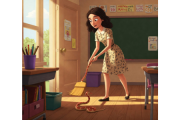“You must be cold,” she said as she took the eggs and put them into the green plastic washtub.
“A little,” I replied. It wasn’t quite dark yet, but I turned on the yard light for Bob and Uncle Roy. I followed Aunt Bette into the kitchen where she was cleaning up dishes. She pointed to the table where a plate of potatoes, peas and roast beef sat waiting for me. I heard Mother, Elizabeth and Mary Ellen praying in the living room. Jo-jo, our budgie fluttered from one side of the cage to the other and then settled down in front of his mirror. I watched as he pecked and cooed at his reflection, and then began preening his wing feathers. The kitchen was warm. Aunt Bette pulled a sweater off the coat rack, handed it to me, and said “eat your supper Mike”. “Thanks.” I said as I took off my blazer and put on the sweater. I didn’t want to talk or eat. She hung my blazer up for me and went back to the kitchen sink. I went to the living room door.
Mother was leading the closing litany: “…I am numbered with those who go down into the pit; I am a man without strength.” They were kneeling in front of the crucifix on the wall.
“We cry out to You, oh Lord, have mercy on us,” Mary Ellen and Elizabeth responded. Mother looked up at me. Her eyes were puffy. She beckoned for me to come and kneel beside her. I remained motionless and shook my head. Tears welled in her eyes. Returning her gaze to the prayer book and her rosary she continued.
“…You have plunged me into the bottom of the pit, into the dark abyss. Upon me, Your wrath lies heavy, and with all Your billows you overwhelm me.” Mother closed the prayer book. She looked up at me. Again, she signaled for me to come to her. I looked up at the picture above Dad’s chair. It was Our Lady of the Prairies. Mary holds a sheaf of wheat in her arms. She floats above a field of golden wheat sheaves and a pond. Mallards are taking off from the pond to join flocks already in the air, leaving, going south. Mary’s eyes do not look at us from this picture. Framed by a halo of bluish-white light, she gazes elsewhere, beyond the horizon into some distant perfect place.





Peter Scotchmer4 years ago
This is a moving and heartfelt evocation of a time of sorrow and dislocation, but with the compensation, however small at the time, of the discovery that life can and must go on despite bereavement, and that the natural world can still surprise us all when we re-establish connection with it, as happens in the final paragraph. What is especially powerful is the vivid use of descriptive detail– the piety of the family’s faith, the devotion of son for his father, the workaday world on a prairie farm, all as seen through a boy’s eyes– to make the story especially memorable. Great stuff!